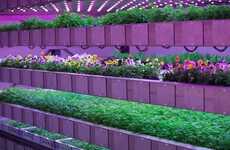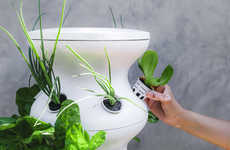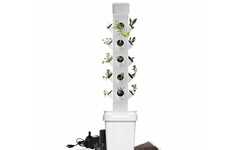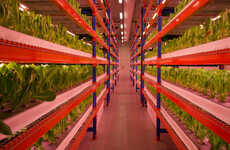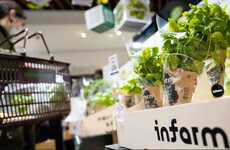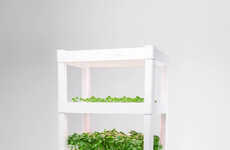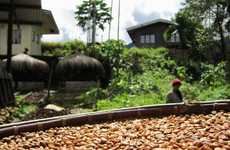
JAPA's Vertical Farm System Offers a Local Food Solution to Singapore
Alyson Wyers — August 1, 2014 — Eco
References: atjapa & fastcoexist
As a part of their Floating Responsive Architecture project, a design firm created a floating vertical farm system to provide dense urban areas with local food. Based out of Barcelona, JAPA designed floating towers to make room for agriculture where there wouldn't otherwise be enough space for farming.
The looping vertical farm towers would offer a solution to densely populated metropolitan countries like Singapore, that often have to import food from far away. The floating farm concept was inspired by local fishing operations which have been in place since the 1930s. This would allow the agricultural operation to float into nearby harbors and provide a local source of food security.
The unconventional looping shape is to optimize the lighting and space. A sensor network integrated into the towers would be able to communicate with people inland about the progress of crops.
The looping vertical farm towers would offer a solution to densely populated metropolitan countries like Singapore, that often have to import food from far away. The floating farm concept was inspired by local fishing operations which have been in place since the 1930s. This would allow the agricultural operation to float into nearby harbors and provide a local source of food security.
The unconventional looping shape is to optimize the lighting and space. A sensor network integrated into the towers would be able to communicate with people inland about the progress of crops.
Trend Themes
1. Floating Vertical Farms - Design and architecture firms can innovate by creating more efficient floating vertical farms to provide dense urban areas with local food sources.
2. Agriculture Technology - There are opportunities to develop advanced sensor networks, lighting systems, and other agriculture technology that can be integrated with vertical farms to optimize crop growth and yield.
3. Local Food Solutions - Entrepreneurs can focus on developing and implementing cost-effective and sustainable local food solutions, such as floating vertical farms, to address the growing demand for locally sourced food in urban areas.
Industry Implications
1. Architecture and Design - Architecture and design firms can partner with agriculture companies to develop more efficient and scalable floating vertical farm systems.
2. Technology - Technology companies can focus on developing advanced sensor networks, lighting systems, and other innovative agriculture technologies that can be integrated into vertical farms.
3. Agriculture - Agriculture companies and entrepreneurs can explore and implement sustainable and cost-effective local food solutions, such as floating vertical farms, to address the increasing demand for locally sourced food in urban areas.
6.2
Score
Popularity
Activity
Freshness

